What Were The Most Important Medieval Marketplace Rules?
Conny Waters - AncientPages.com - Visiting a marketplace in the Middle Ages could be a pleasant experience. However, honesty was crucial because practices such as fraud and theft were subject to harsh punishment.
In Medieval England marketplaces England, markets typically took place weekly.
Credit: Adobe Stock - lutjo1953
These marketplaces were excellent opportunities for buying and selling goods and also functioned as social hubs where people could interact with each other.
Medieval Practices Of Cutting Coins In Pieces
It was common knowledge there were special trading rules which everyone had to follow.
"Coin was increasingly important in the growing market economy of late medieval England and to ensure confidence in this medium of exchange the sovereign attempted to exert control." 1
Cheating with gold, silver or producing falsified coins were serious crimes. "In the tenth century, Aethelstan (929–39) was the first to declare that there should be one coinage in his realm and that money should be minted only in the towns ascribed. The penalty for base moneyers who produced light coins was for them to have their hand cut off and displayed on the mint." 1
In the past, small traders did not necessarily require a whole coin for their transactions. Instead, coins were often divided into smaller segments, which were then utilized for several payments, diminishing their practical value.
Everyone Could Be Punished
All cheaters, whether male or female, were punished. In England, moneylenders who imposed exorbitantly high-interest rates were subjected to public humiliation. They were bound to a chair and paraded around the market town. The mode of transportation used for this purpose was typically an open wagon, commonly utilized for carrying manure.
In Italian towns with narrow streets and little space, it was forbidden to throw meat on the ground.
In Florence, the butchers maintained cleanliness in their selling areas, ensuring no rotten remains were left behind. However, due to the value of meat scraps and other waste materials, cities would auction the cleaning rights of these squares. The highest bidder would then collect these waste materials for resale.
The success of a market also heavily depended on whether local authorities could enforce law and order. For instance, in Leicester, England, individuals who caused disturbances by drawing their swords within the market's vicinity faced stricter penalties than usual. In other places, visitors were prohibited from bringing weapons through city gates to maintain peace and order.
Illegal Marketplaces
"Some of these rural markets were associated with churches. In 1488, illegal markets held at the Cistercian nunnery of Skokloster and at a church called Ness were ordered to close. Christian churches that had replaced pagan cult centres continued to provide opportunities for buying and selling, although there is little direct evidence of Sunday trading in Scandinavia as there is in England.
Swedish market charters beginning in the late thirteenth century are concerned only with weekday markets (Ku/turhistorisk Leksikon, xviii, col. 480), but the thirteenth century law of Gotland provided for the sale on Sundays of cheese, butter, fish, fowls and meat, but not four, seeds or other goods. In1531 Gustav Vasa complained that illegal fairs were becoming so frequent that there would soon be one held at every church festival." 1
Price Controls
There were limits on how much a Medieval seller could demand for a product. To manage price fluctuations on basic products, a price cap was implemented on items like bread, wine, and beer.
Medieval market. Credit: Public Domain
The price ceiling would ensure that even the lowest classes of society could afford food, thus preventing rebellion. "Maximum prices of meat were occasionally set in a number of individual boroughs, perhaps drawing on statutory precedent, and showed how local price-fixing was sometimes tolerated." 1
In England, the pricing of essential products was determined by the King. He appointed two price controllers in every city throughout the kingdom. Their responsibility was to monitor marketplaces for fraudulent activities. If they discovered anyone attempting to charge more than the permitted price, punitive measures, including fines, were taken.
In the medieval marketplace, the rules were universal, applying to both sellers and buyers alike.
Written by Conny Waters – AncientPages.com Staff Writer
Copyright © AncientPages.com All rights reserved. This material may not be published, broadcast, rewritten or redistributed in whole or part without the express written permission of AncientPages.com
Expand for references- James Davis - Medieval Market Morality: Life, Law and Ethics in the English Marketplace, 1200–1500
- Tim Pestell, Katharina Ulmschneider - Markets in Early Medieval Europe: Trading and 'Productive' Sites, 650-850
- Dennis Romano - Markets and Marketplaces in Medieval Italy, C. 1100 to C. 1440
More From Ancient Pages
-
 10 Ancient Fortresses Of Historical Importance
Civilizations | Jan 11, 2016
10 Ancient Fortresses Of Historical Importance
Civilizations | Jan 11, 2016 -
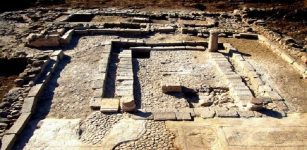 2,000-Year-Old Ruins In Mary Magdalene’s Town Of Magdala On The Shore Of The Sea Of Galilee
Biblical Mysteries | Dec 26, 2014
2,000-Year-Old Ruins In Mary Magdalene’s Town Of Magdala On The Shore Of The Sea Of Galilee
Biblical Mysteries | Dec 26, 2014 -
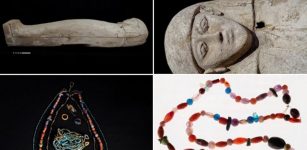 Beautiful Necklaces And Amulets Discovered In Ancient Egyptian Tomb
Archaeology | Apr 27, 2020
Beautiful Necklaces And Amulets Discovered In Ancient Egyptian Tomb
Archaeology | Apr 27, 2020 -
 Great And Never Explained Mysteries Of Nevada’s History
Artifacts | Jun 24, 2014
Great And Never Explained Mysteries Of Nevada’s History
Artifacts | Jun 24, 2014 -
 Interbreeding With Modern Humans Wiped Out Neanderthals’ Y Chromosomes 100,000 Years Ago
Archaeology | Sep 28, 2020
Interbreeding With Modern Humans Wiped Out Neanderthals’ Y Chromosomes 100,000 Years Ago
Archaeology | Sep 28, 2020 -
 Enigma Of Étienne Le Ray – Unusual Vagabond Prophet Nicknamed Nostradamus Of Brittany
Featured Stories | Sep 28, 2020
Enigma Of Étienne Le Ray – Unusual Vagabond Prophet Nicknamed Nostradamus Of Brittany
Featured Stories | Sep 28, 2020 -
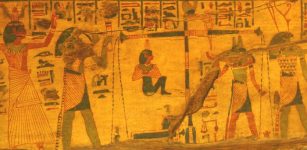 Meskhenet: Egyptian Goddess Of Household And Childbirth Who Governed Over Fate And Destiny
Egyptian Mythology | Mar 14, 2019
Meskhenet: Egyptian Goddess Of Household And Childbirth Who Governed Over Fate And Destiny
Egyptian Mythology | Mar 14, 2019 -
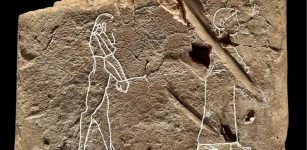 World’s Oldest Depiction Of A Ghost Discovered On 3,500-Year-Old Babylonian Tablet
Archaeology | Oct 20, 2021
World’s Oldest Depiction Of A Ghost Discovered On 3,500-Year-Old Babylonian Tablet
Archaeology | Oct 20, 2021 -
 Roman Cosmetics Shop Discovered In The Ancient City Of Aizanoi, Turkey
Archaeology | Sep 29, 2023
Roman Cosmetics Shop Discovered In The Ancient City Of Aizanoi, Turkey
Archaeology | Sep 29, 2023 -
 Did Pharaoh Shishak Plunder King Solomon’s Temple?
Biblical Mysteries | Jan 15, 2020
Did Pharaoh Shishak Plunder King Solomon’s Temple?
Biblical Mysteries | Jan 15, 2020 -
 Has The Mystery Of The Hobbits Finally Been Solved?
Archaeology | Apr 21, 2017
Has The Mystery Of The Hobbits Finally Been Solved?
Archaeology | Apr 21, 2017 -
 Enigmatic Dispilio Tablet, Neolithic Flutes And The Traditional History Of Writing
Artifacts | May 30, 2024
Enigmatic Dispilio Tablet, Neolithic Flutes And The Traditional History Of Writing
Artifacts | May 30, 2024 -
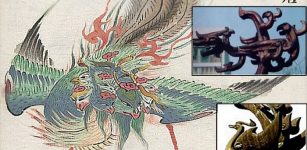 Nine-Headed Bird: Mythical Creature Worshiped In Ancient China
Chinese Mythology | Oct 29, 2016
Nine-Headed Bird: Mythical Creature Worshiped In Ancient China
Chinese Mythology | Oct 29, 2016 -
 How Greenland Got The ‘Wrong’ Name Thanks To Viking Erik The Red
Ancient History Facts | Mar 21, 2017
How Greenland Got The ‘Wrong’ Name Thanks To Viking Erik The Red
Ancient History Facts | Mar 21, 2017 -
 Roman Square Capitals: Prestigious Script That Delighted Human Eye With Its Elegance
Featured Stories | Sep 16, 2019
Roman Square Capitals: Prestigious Script That Delighted Human Eye With Its Elegance
Featured Stories | Sep 16, 2019 -
 Stone Age People Used Human Bones For Making Pendants
Archaeology | Jul 6, 2022
Stone Age People Used Human Bones For Making Pendants
Archaeology | Jul 6, 2022 -
 Parthian Jar Burial Dated To 247 BC – 224 CE Unearthed In Iran’s Kurdistan Province
Archaeology | Sep 29, 2020
Parthian Jar Burial Dated To 247 BC – 224 CE Unearthed In Iran’s Kurdistan Province
Archaeology | Sep 29, 2020 -
 Ancient Secrets Of The Amazon Jungle – The Man Who Stepped Into The Unknown Searching For The Lost City Of The Gods – Part 2
Featured Stories | Mar 5, 2019
Ancient Secrets Of The Amazon Jungle – The Man Who Stepped Into The Unknown Searching For The Lost City Of The Gods – Part 2
Featured Stories | Mar 5, 2019 -
 Evidence Of An Unknown Ancient Civilization In The Yucatan?
Featured Stories | Apr 6, 2024
Evidence Of An Unknown Ancient Civilization In The Yucatan?
Featured Stories | Apr 6, 2024 -
 Hina Matsuri Festival – Sending Dolls In Boats Into The Ocean To Celebrate Girl’s Day In Japan – Ancient Shinto Tradition
Ancient Traditions And Customs | Apr 29, 2019
Hina Matsuri Festival – Sending Dolls In Boats Into The Ocean To Celebrate Girl’s Day In Japan – Ancient Shinto Tradition
Ancient Traditions And Customs | Apr 29, 2019


